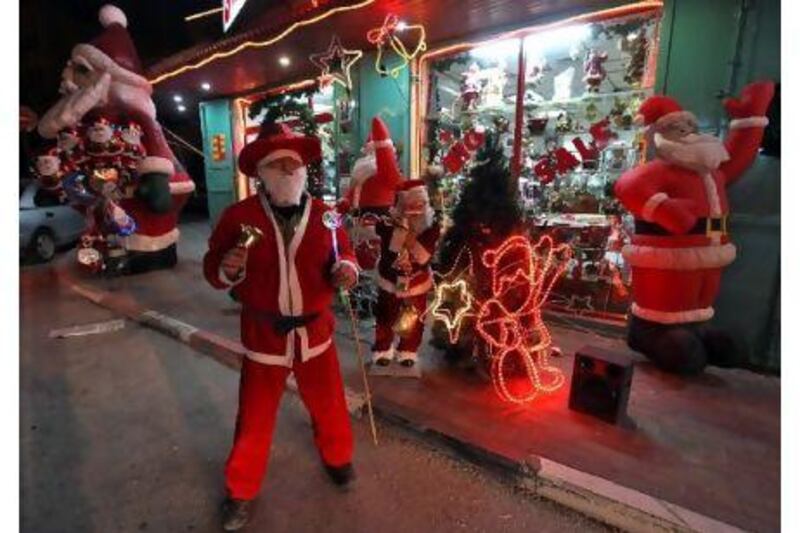In the city where tradition says the Virgin Mary gave birth to Jesus Christ, streets once left foreboding amid the second intifada are now buoyed by a newfound sense of hope.
On the day before Christmas Eve, around Manger Square, Bethlehem's historic centre, Muslim and Christian patrons lounged in the coffee shops and restaurants. A cross between Elvis Presley and Neil Diamond, a street performer in a flashy jumpsuit crooned 1970s American pop anthems to swarms of onlookers. City officials and politicians from the West Bank's government, the Palestinian Authority (PA), had prepared the area for the Christmas festivities hoping to attract close to 100,000 visitors.
"Everything's changed," said Father Ibrahim Faltas, a Franciscan friar. In 2002, he helped mediate an end to a standoff between Palestinian fighters who held off Israel's military from inside the Church of Nativity. Eight Palestinians were killed and an Armenian monk was wounded in the standoff.
Pockmarks from the siege's gun battles scar the church, believed to rest atop the biblical site where Mary and Joseph had the newborn baby Jesus. Now, with help from PA funds, the church is receiving much-needed renovations.
It is another of the unmistakable signs of hope, Mr Faltas says, as he prepared to take part in the celebrations. "There's authority here. The streets are clean."
The changes also instil similar sentiments among the city's informal guides, who rely on tourism for their livelihoods in a West Bank economy that is otherwise struggling to create jobs.
Not in a decade have so many pilgrims and foreigners perused the city's landmarks, says Saed al Tammari, 26, a local tour guide who pounces on unsuspecting tourists with his American-accented English.
Yet, despite the improvements, business has not matched his expectations. While nearly 1.5 million tourists are estimated to have visited the city this year - up roughly 60 per cent from the previous - Mr Tammari, and just about everyone else in Bethlehem, complain that the expected windfall for increased tourism is not trickling down as they would like.
"We're talking about the birthplace of Jesus. All the world's eyes are focusing on this place," he said, trying to reconcile the upswing in visitors with his lacklustre income.
Then, without notice, he darted towards an Italian couple wandering near the church, attempting to lure in their business with his signature pitch: "Believe me, I can show you the real Bethlehem!"
They rejected his enthusiastic entreaty.
Pointing to a group of Russian tourists, a glum Mr Tammari describes the problem as: "Look, we have had a strong season with these big groups, but we don't make profit from them."
Indeed, turning the streams of tourists here into profits for the community remains a challenge. Impeding this, many here say, is a combination of Israel's scaled-back - yet still stifling - occupation of the West Bank and a virtual racket between Israeli tour operators who take their tourists to only a handful of Bethlehem merchants.
Khalil Tamari,the owner of Old Cave Souvenirs, is not one of those merchants.
"Business here is bad," said Mr Tamari, whose small shop off Milk Grotto Street sells religious figurines carved from the wood of olive trees.
He had the misfortune of opening his business at about the time of the second intifada in 2000.
"It was good, really good, but then we didn't know it would all turn upside in one day," he said, referring to the visit that year by Ariel Sharon, a former Israeli prime minister, to the Haram al Sharif in Jerusalem's Old City. The visit to one of Islam's holiest sites is believed to have ignited the second intifada.
Even with the PA providing more law and order to the West Bank, his business has struggled to attract customers. "They come in the large groups, go to the church, eat at a restaurant, go to one shop - and then back to Jerusalem," said Mr Tamari, who receives less than half a dozen customers on any given day.
PA officials blame those in his predicament on Israel's virtual stranglehold over land that they want to form part of their future.
Israel's separation barrier still deters many tourists from visiting Bethlehem, they say. Moreover, about half of the city's visitors stay in Jerusalem hotels, usually opting for Israeli-run tour operators who only take them for brief stopovers in Bethlehem.
And yet, as Ghassan Khatib, a PA spokesman in Bethlehem for the Christmas ceremonies, describes the situation, there is, again, hope.
"It spite of this, we get arrivals and have this improvement," he says. "It's an indication of the high potential of Bethlehem."






